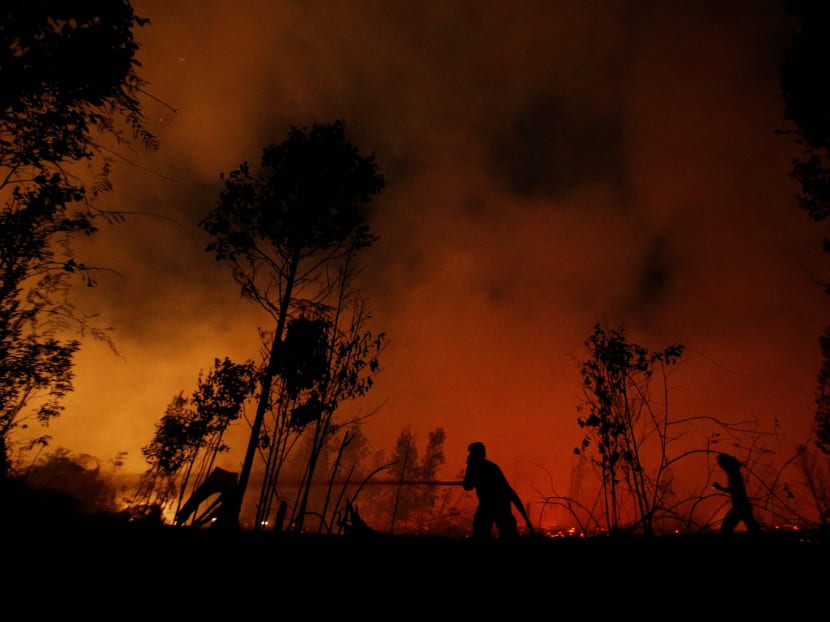'We didn't start the fire', say Malaysian palm oil firms
KUALA LUMPUR — Fires on Malaysian-owned oil palm plantations in Indonesia originated from neighbouring lands, said a commodity trade group.

Firefighters try to extinguish forest fires at Sebangau National Park area in Palangka Raya, Central Kalimantan province, Indonesia, Sept 14, 2019.
KUALA LUMPUR — Fires on Malaysian-owned oil palm plantations in Indonesia originated from neighbouring lands, said a commodity trade group.
Malaysian Palm Oil Association (MPOA) has refuted allegations that they caused the fires, adding that the fires started on independent smallholdings.
“They were not caused by Malaysian companies or their staff,” MPOA chairman Franki Anthony Dass told The Malaysian Insight.
The wildfires in Sumatra and Kalimantan have caused thick clouds of smoke to drift towards Malaysia and Singapore, and sent air quality levels plunging to very unhealthy levels in all three countries.
Indonesian authorities have claimed that some of these fires were on plantations operated by local subsidiaries of Malaysian palm oil firms, which the MPOA has refuted.
The fires, whether deliberate or accidental, got out of control and spread to the plantations owned by the Malaysian firms, said Mr Dass.
He said because of the close proximity between the independent smallholders and the plantations, these fires are then picked up as hotspots by satellites.
“So the hotspot readings look like the fires are coming from our plantations and that we had started them,” Mr Dass said.
“But in reality these fires are in private smallholdings and they had spread to our land.”
He explained that unlike most of the plantations in Malaysia, Indonesian palm oil concessions often had pockets of villages within their area who run independent small estates.
“These villagers and planters own their land and the smallholdings within the big firm’s concessions. So when a fire is started in their own land, it can get out of control and spread to the Malaysian firm’s area.”
All Malaysian firms and subsidiaries operating in Indonesia and other parts of the world have a strict no-burning policy as part of their commitment to sustainable certification schemes, Mr Dass said.
“All our members don’t allow any burning on their lands,” said Mr Dass.
The MPOA has more than 120 members including the country’s biggest palm oil players such as Sime Darby, United Plantations, IOI Plantations and Kuala Lumpur Kepong Bhd (KLK).
More than half of these companies have operatair ions in Indonesia and other parts of the world.
Malaysian palm oil firms Sime Darby, KLK, IOI and TDM Bhd recently got into the news after open fires had been spotted in their plantations in Indonesia.
Indonesian authorities had also sealed off land belonging to these four firms.
Malaysian Prime Minister Dr Mahathir Mohamad had also said that Malaysia would go after local firms who were found responsible for setting such fires.
Sime Darby Plantations has refuted these allegations and stressed that the fires occurred outside their operational area in Indonesia. IOI has also denied these allegations.
TDM, however, has admitted that about 1,200ha of its land had been on fire but that it has managed to control the blaze.
Mr Dass said due to the proximity of smallholdings and farmers to the firms’ concessions, many companies have taken proactive measures to educate their neighbours on the dangers of open burning.
“Whenever we detect a fire in a smallholding or village close to us, we make the report ourselves to the authorities.”
Some companies even have 5km buffer zones between their plantations and land that is not theirs to stop the spread of wildfires.
Others have their own fire-fighting teams who are deployed to put out blazes that occur even in these independent smallholdings.
Aside from fires in smallholdings, there are individuals who deliberately set fires on land next to plantations and then run away.
“You can’t catch these people. It’s because the slash-and-burn technique is the cheapest method to clear land. And then they plant crops.
“So despite the precautions we take, when it’s extraordinarily dry, fires can start even by a cigarette butt. And the flames spread fast when there are strong winds,” Mr Dass said. THE MALAYSIAN INSIGHT






